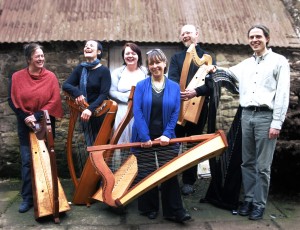
They are only six however to perform those instruments, mixing acoustic and electronic sounds, gut, nylon and wire strings. The wager is a success with an astonishing result. Rarely has such a fusion of harmonics been heard. In a pure musical alchemy, forgetting it’s a harp concert, the audience is blown away by a real program symphony of the modern time.
Surprising
The Song of the Oak and the Ivy is based on Eugene Field’s tale The Oak-tree and the Ivy written in 1886. From this transcendental love between the Oak and the Ivy, here, as anywhere else, appearances are deceptive and one shouldn’t leave it there. Coming from millenary legends, including La Fontaine, enchanting features hide the most sensitive stories and directions could change at any time.
The music begins in this idyllic setting. Four movements to tell the story. Love, absence, magic and reality are some of the themes represented by the diversity of the instruments’ sounds. In the symbiotic nature of the oak and the ivy is found a particular echo of the link established between the harps themselves, from medieval time to modern time.
On the stage, the conversation is between instruments who are answering each other. They resonate, intermingle like the ivy around the oak, all in harmony. The roots are deep. Introductory jigs, strathspeys of the oak and tales from all over the world, the branches reach new horizons, occasionally obstructed by electric storms and turmoil. Love song, reels of contentment - the picture is complete.

The Song of the Oak and the Ivy was a commission to celebrate both the 80th anniversary of the Clàrsach Society and the 30th anniversary of the Edinburgh International Harp Festival. Music by Corrina Hewat, story by Eugene Field, length: 45 minutes. With Corrina Hewat (acoustic and electro-harps), Mary Macmaster (wire string acoustic and electro-harp), Wendy Stewart (acoustic and electro-harps), Heather Downie (acoustic and electro-harps), Bill Taylor (wire string acoustic harp) – at the Festival Interceltique de Lorient, he was replaced by Dimitri Boekhoorn – and Tristan Le Govic (electro-acoustic harp).
World premiere at the Edinburgh International Harp Festival, Merchiston Castle School, on the 12th of April 2011. The work has also been performed at the Edinburgh Fringe Festival (Edinburgh, 2011), Harp Village (Cromarty, 2011), Dunblane (Victoria Hall, Dunblane, 2011), Celtic Connections (Strathclyde Suite, Royal Concert Hall, Glasgow, 2012), Festival Interceltique de Lorient (Palais des Congrès, Lorient, Brittany, 2012).